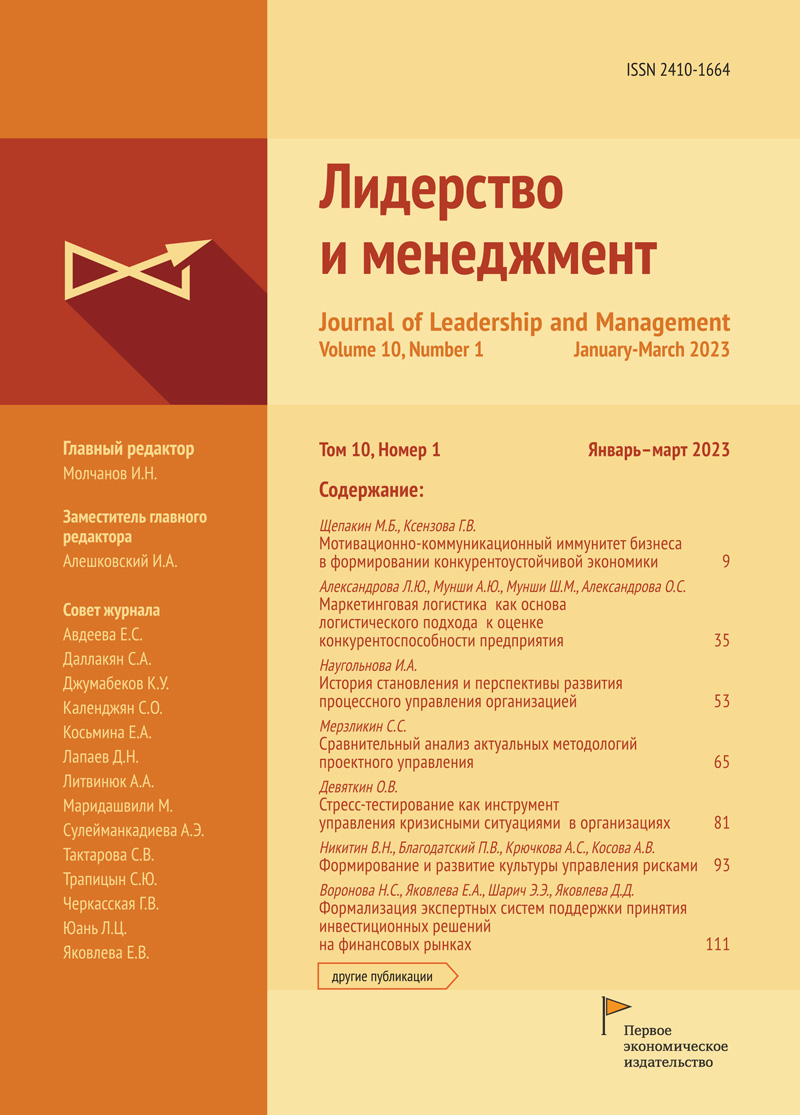Corporate culture values as an HR management tool
- Autores: Kaloshina T.Y.1, Belskaya Y.V.1,2
-
Afiliações:
- Novosibirsk State Technical University
- The Siberian State University of Geosystems and Technologies (SSUGT)
- Edição: Volume 10, Nº 1 (2023)
- Páginas: 139-150
- Seção: Articles
- URL: https://journals.eco-vector.com/2410-1664/article/view/607950
- DOI: https://doi.org/10.18334/lim.10.1.117242
- ID: 607950
Citar
Texto integral
Resumo
The most significant element in the modern concept of HR management is the recognition of a person as a key resource of organizations and, as a result, focus on creating conditions for the realization of his potential. The cultural component here is one of the most significant intangible assets, the central basis of the organization's life cycle. Namely, these are the values, norms and attitudes that are accepted and shared by both managers and ordinary employees of the company. In the context of digital transformation and hybrid work formats, corporate culture as an HR management tool is of particular importance. In the article, the authors answer the following questions. What is corporate culture? What value orientations allow using corporate culture as an HR management tool? It is necessary to try to answer these questions, since corporate culture is the most important tool for the long-term successful development of the company, uniting employees around strategic goals.
Palavras-chave
Sobre autores
Tatiana Kaloshina
Novosibirsk State Technical University
Email: kaloshinatu@mail.ru
Yuliya Belskaya
Novosibirsk State Technical University; The Siberian State University of Geosystems and Technologies (SSUGT)
Email: belskaya@corp.nstu.ru
Bibliografia
- Балашов А.П. Организационная культура. / Учебное пособие. - М.: Инфра-М, 2016. – 276 c.
- Бельская Ю.В. Философские основания понимания экономического поведения человека в пространстве экономической теории и образовании // Философия образования. – 2010. – № 3(32). – c. 77-82.
- Брижак О.В. «Экономики солидарности»: потенциал развития в корпорации // Научный вестник Южного института менеджмента. – 2013. – № 4. – c. 87-92.
- Грошев И.В., Емельянов П.В., Юрьев В.М. Организационная культура. / Учебное пособие. - Москва: ЮНИТИ-ДАНА, 2017. – 288 c.
- Исаев А.П., Чэ Дэсинь Модель корпоративной культуры для развития предприятий с межнациональным персоналом // Лидерство и менеджмент. – 2022. – № 3. – c. 767-788. – doi: 10.18334/lim.9.3.114883.
- Калошина Т.Ю. Цифровые инструменты в практике адаптации молодых специалистов // Экономика труда. – 2021. – № 12. – c. 1473-1484. – doi: 10.18334/et.8.12.113879.
- Лазвиашвили Л. Связь между политикой менеджмента и корпоративной культурой // Лидерство и менеджмент. – 2018. – № 2. – c. 71-76. – doi: 10.18334/lim.5.2.40089.
- Персикова Т.Н. Корпоративная культура. - Москва: Логос, 2020. – 288 c.
- Погребняк В.А. Культура организации как объект регулярного управления // Вопросы управления предприятием. – 2005. – № 1(13). – c. 59.
- Роджерс Ф. Взгляд изнутри: Человек–фирма–маркетинг. - М., 1999.
- Руденко Г.Г., Сидорова В.Н., Сидоров Н.В., Полевая М.В. Управление талантами как современная технология управления персоналом. / Монография. - Москва: Русайнс, 2021. – 160 c.
- Кибанов А.Я. и др. Управление персоналом в России: история и современность. - М.: Инфра-М, 2022. – 240 c.
- Устичева Е.Г. Формирование корпоративной культуры российской государственной службы // Экономика труда. – 2015. – № 1. – c. 61-76. – doi: 10.18334/et.2.1.280.
- Цыганкова И.В., Хуан Инь Корпоративная культура как фактор формирования качества трудовой жизни работников российских и китайских организаций // Экономика труда. – 2022. – № 4. – c. 841-856. – doi: 10.18334/et.9.4.114542.
- Чуланова О.Л. Современные технологии кадрового менеджмента: актуализация в российской практике, возможности, риски. / Монография. - М.: ИНФРА-М, 2020. – 364 c.
- Gold K. Managing for Success: A comparison of the private and public sectors // Public Administration Review. – 1982. – № 6. – p. 568-575. – doi: 10.2307/976127.
- Jaques E. The changing culture of a factory. - New York: Dryden Press, 1952.
- Kroeber A., Kluckholn C. Culture: a critical review of concepts and definitions. - Cambridge, MA: Peabody Museum, 1952. – 96-97 p.
- Ouchi W. Theory «Z»: How American business can meet the Japanese challenge. - Reading, MA: Addison-Wesley, 1981.
- Shein E.H. Organizational Culture and Leadership: A dynamic view. - San Fransisco. CA.: Jossey-Bass Inc., 1985.
Arquivos suplementares









